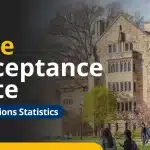Most U.S. colleges ask for 1 to 3 recommendation letters, usually from your teachers and counselors. These letters are important because they give admissions committees insight into who you are—your character, work ethic, and potential—beyond what grades and test scores can reveal. In fact, according to the National Association for College Admission Counseling (NACAC), more than 50% of colleges view recommendation letters as a significant part of the admissions process.
Given their importance, you must know how many letters you need and how to make them count. We’ll cover all you need to know about college recommendation letters—from how many to submit, to who should write them, and what makes a letter strong. We’ll even include a sample letter template for your recommender to use.
- How Many Recommendation Letters Should I Send for College Applications?
- Are Letters of Recommendation Important?
- Who Should Write My Letters of Recommendation for College?
- How to Ask for a College Letter of Recommendation
- How Long Should a Letter of Recommendation for College Be?
- Letter of Recommendation for College Sample Template
- What to Do If You Can’t Get the Required Number of Recommendation Letters
- Frequently Asked Questions
- Takeaways
How Many Recommendation Letters Should I Send for College Applications?
When applying to U.S. colleges, you’ll usually need to submit 1 to 3 recommendation letters from teachers and counselors. Here’s a quick breakdown of what some top U.S. colleges require, as of Fall 2023:
From the breakdown, you’ll notice that Ivy League schools typically ask for two teacher recommendations along with a counselor recommendation. For example, Harvard, Princeton, and Yale all follow this standard, which fits with their holistic approach to admissions. These schools value understanding both the personal and academic sides of their applicants, and recommendation letters are key to this process.
That said, not every college needs recommendation letters. Some schools, like those in the University of California system (UC Berkeley, UCLA, UC San Diego), and large public universities like the University of Texas at Austin and Georgia Tech, don’t require any recommendation letters at all. These schools often place more emphasis on factors like standardized test scores and academic records.
To get the full details on what each school requires, you may click the school’s name in the table. Also, be sure to check directly with the colleges you’re applying to.
Are Letters of Recommendation Important?
Colleges rely on letters of recommendation to get a deeper sense of who you are—beyond just your grades and test scores. These letters help admissions teams understand your character, academic abilities, and how you might contribute to their campus community.
A 2023 report from the National Association for College Admission Counseling (NACAC) found that over 50% of 185 surveyed four-year colleges see recommendation letters as an important part of their admissions decisions. Here’s a closer look at how these colleges evaluated the importance of these letters:
| Requirement | Considerable Importance | Moderate Importance | Limited Importance | No Importance |
| Teacher recommendation | 10.8% | 40.5% | 28.1% | 20.5% |
| Counselor Recommendation | 11.9% | 40% | 27.6% | 20.5% |
For teacher recommendations, about 51.3% of colleges rated them as having either considerable or moderate importance. Similarly, for counselor recommendations, 51.9% of colleges felt the same way. This data shows that while not all colleges put heavy emphasis on recommendation letters, they are still a crucial element for many schools, especially in selective admissions.
Recommendation letters can be particularly important in several situations:
- If your academic record puts you on the edge of acceptance, a strong recommendation letter can tip the scales by highlighting qualities that might not be obvious from grades alone.
- In schools where most applicants have strong academic records, recommendation letters can help set you apart by emphasizing your unique strengths, personal traits, and potential contributions to the school community.
- If you’ve faced challenges or have a non-traditional background, recommendation letters can provide important context, explaining how these experiences have shaped you and making a compelling case for your admission.
While not every college gives the same weight to letters of recommendation, they are a key part of the application process for many schools. These letters help admissions committees see the bigger picture of who you are as a student and as a person.
Who Should Write My Letters of Recommendation for College?
Pick the right people to write your recommendation letters. You want to choose folks who can give a detailed, positive, and personal account of who you are, both academically and as a person. Here’s who you should consider:
1. Teachers
Teachers are the go-to choice for recommendation letters, especially those who’ve taught you in core subjects like English, Math, Science, or History. It’s even better if they’ve taught you during your junior or senior year, as they can provide a more up-to-date assessment of your abilities and potential.
If you can, pick a teacher who has seen you excel in subjects related to your intended major—they can offer insights that directly align with your academic goals.
2. Counselors
A counselor’s recommendation gives a broader view of your academic journey and personal development. They can put your achievements and challenges into context, which is valuable for admissions committees.
However, how well they know you might depend on your school’s size and the counselor-to-student ratio. That’s why it’s a good idea to build a relationship with your counselor early on and keep them in the loop about your goals and accomplishments.
3. Extracurricular leaders
If you’re heavily involved in extracurricular activities, think about asking a coach, club advisor, or another leader who’s closely supervised your work. These people can speak to your leadership, teamwork, and passion outside the classroom. Their recommendations can add another layer to your application by highlighting qualities that might not come through in your academic records.
How to Ask for a College Letter of Recommendation
If you approach it the right way, you’ll make the process of asking for a recommendation letter smoother and increase your chances of getting a strong, personalized letter. Here’s how to handle it effectively:
1. Be thoughtful.
Ideally, pick teachers or recommenders who know you well and can talk about your strengths with specific examples. A generic letter won’t do much for you, no matter who writes it. So, avoid choosing someone just because they have a fancy title or are well-known—if they don’t really know you, their letter will probably lack the depth you need to make a strong impression.
Once you’ve identified the right people, try to ask them in person if you can. This gives you a chance to have a real conversation and see if they’re genuinely willing to write the letter.
If meeting in person isn’t possible, sending a polite and well-structured email is the next best thing. Be sure to explain why you’re asking them specifically and mention how much you’ve appreciated their class or mentorship.
2. Consider the timing.
Aim to ask your teachers or other recommenders at least four to six weeks before your application deadline. This gives them plenty of time to write a thoughtful and detailed letter without feeling rushed.
If you can, consider asking at the end of your junior year or right at the beginning of your senior year. That way, your request might be one of the first they get, and they’ll have more time, even over the summer, to work on it.
3. Provide helpful information.
To help your recommender write the best letter possible, make sure they have all the information they need. This might include your resume, a list of colleges you’re applying to, deadlines, and any specific points you’d like them to cover.
A “brag sheet” that outlines your achievements, goals, and any challenges you’ve overcome can be especially helpful. Also, remind them of any relevant experiences or projects you’ve worked on together—this can jog their memory and prompt them to include specific examples in their letter.
How Long Should a Letter of Recommendation for College Be?
A typical recommendation letter for college should be about one to two pages long, or roughly 400-600 words. This length gives your recommender enough space to provide a detailed and thorough account of your abilities, character, and accomplishments without dragging on too long.
What should be included in the recommendation letter
In those 400-600 words, the letter should cover a few key areas:
- First, the recommender should explain their relationship to you. How long have they known you and in what capacity (like as your teacher, counselor, or coach)? This sets the stage for their observations and gives context to what they’re saying.
- Next, the letter should highlight your academic strengths with specific examples of your work or contributions in class. It’s also important for the recommender to talk about your personal qualities, like leadership, resilience, or teamwork, again using concrete examples to back up these traits.
Quality over quantity
It’s easy to think that a longer letter is better, but it’s really about quality, not quantity. Admissions officers read tons of recommendation letters, so a concise, well-written one that clearly showcases your strengths and potential will stand out more than a longer one that’s full of generalities.
A strong letter uses specific examples to paint a clear picture of who you are as a student and a person. It’s much better to have a focused, impactful letter than one that rambles without adding much value.
Letter of Recommendation for College Sample Template
A strong letter of recommendation should be structured, specific, and personal. Here’s a sample template of what an effective recommendation letter might look like:
[Teacher’s Name]
[School Name]
[School Address]
[City, State, ZIP Code]
[Email Address]
[Date]
Admissions Committee
[College Name]
[College Address]
[City, State, ZIP Code]
Dear Admissions Committee,
I am writing to strongly recommend [Student Name] for admission to [College Name]. I have had the pleasure of teaching [Student Name] in my [Subject] class during their junior and senior years, and I have observed their exceptional abilities both in and out of the classroom.
[Student Name] is an incredibly bright and dedicated student who consistently demonstrates a deep understanding of complex concepts. In my [Subject] class, they excelled in every assignment, often going beyond the required work to explore topics in greater depth. One project that stands out was their research on [specific project or topic], where [Student Name] not only presented a thorough analysis but also drew connections to real-world applications, impressing both me and their peers.
Beyond academic achievement, [Student Name] is a natural leader. They took the initiative to start a [specific club or activity] at our school, which has now become one of the most active student organizations. Their ability to motivate others and their passion for [related subject or activity] were key factors in the club’s success.
Moreover, [Student Name] possesses a remarkable character. They are empathetic, always willing to help their classmates, and demonstrate a level of maturity that is rare for someone their age. I am confident that they will contribute positively to the [College Name] community and excel in their future endeavors.
In conclusion, I wholeheartedly recommend [Student Name] for admission to [College Name]. They have the intellectual curiosity, leadership skills, and character that will make them an outstanding addition to your institution.
Sincerely,
[Teacher’s Name]
Why this recommendation letter for college works
This sample captures the key components of a strong recommendation letter, making it both informative and compelling for admissions committees:
- Specific examples. The letter includes specific achievements, like a notable project, that highlight the student’s abilities.
- Personal insight. The teacher shares personal anecdotes that reveal the student’s character, leadership, and contributions to the school community.
- Strong closing. The letter ends with a confident endorsement, clearly stating why the student is an excellent candidate for the college.
What to Do If You Can’t Get the Required Number of Recommendation Letters
Sometimes, despite your best efforts, it might be tough to get the required number of recommendation letters for your college application. Whether your school has limited resources or you’ve had trouble connecting with teachers or counselors, there are other ways to strengthen your application:
1. Look for alternative recommenders.
If teachers and counselors aren’t available, think about other adults who know you well. Coaches, employers, club advisors, or community leaders who’ve worked closely with you can offer valuable insights. These people can speak to your leadership skills, work ethic, and character—qualities that are just as important to many colleges.
2. Consider additional essays.
If you can’t secure the needed letters, offering additional essays or a more detailed personal statement can be a good alternative. Some colleges might let you submit a supplementary essay where you can explain your situation and share more about your experiences and qualifications.
3. Request an interview.
Another route you can take is requesting an interview with the admissions office. Some colleges include interviews as part of the application process, and this can be a great chance to make a personal impression.
During the interview, you can highlight your strengths, talk about any challenges you’ve faced in getting recommendations, and give more context about your academic and extracurricular achievements.
4. Communicate with the admissions office.
Lastly, if you’re having trouble, don’t hesitate to reach out directly to the admissions office. Explain your situation and ask if there are other ways to meet the recommendation letter requirement. Colleges are often willing to work with applicants to find a solution, especially if the issue is beyond your control.
Frequently Asked Questions
How many letters of recommendation do most colleges require?
Most colleges ask for 1 to 3 letters of recommendation. Usually, this includes one or two from teachers and one from a school counselor. Some colleges might even ask for extra letters if they want to know more about your extracurricular activities or special talents.
Is 3 letters of recommendation too much?
Three letters of recommendation are generally fine, especially if the college asks for that number. Just make sure each letter adds something unique to your application. Submitting more than the requested number could overwhelm the admissions committee, so only send extra letters if they each offer a different perspective on your abilities.
Is 1 recommendation letter enough?
One recommendation letter might be enough if that’s all the college requires. However, many colleges prefer two or three letters to get a fuller picture of who you are. It’s important to check the specific requirements of each school you’re applying to.
Can I submit more than 3 recommendation letters?
While some colleges allow more than three recommendation letters, it’s usually best to stick to the requested number unless you have a strong reason to include more. Any extra letters should offer new insights that aren’t covered by the required ones. Sending too many could lessen the impact of your recommendations.
Can I ask the same person for a letter of recommendation twice?
Yes, you can ask the same person for a letter of recommendation more than once, especially if it’s for different applications like college and scholarships. Just make sure the recommender updates the letter to reflect your most recent achievements and activities to keep it relevant and strong.
Takeaways
When preparing your letters of recommendation for college, here are the things to remember:
- Most colleges ask for 1 to 3 recommendation letters from teachers and counselors, but the exact number can vary. Make sure you check each college’s specific requirements to meet their expectations.
- Choose recommenders who really know you and can give detailed, personalized insights into your abilities and character. Teachers from your junior or senior year are usually your best bet.
- A good recommendation letter should be 400-600 words or 1-2 pages long, with a focus on specific examples that highlight your strengths and contributions. The quality and relevance of what’s written matter more than the length.
- If you can’t get the required number of recommendation letters, consider other options like submitting extra essays, requesting an interview, or asking alternative recommenders such as coaches or employers.
- For personalized help, consider reaching out to a college admissions consultant. They can guide you through the recommendation letter process and answer any other questions you might have.






















